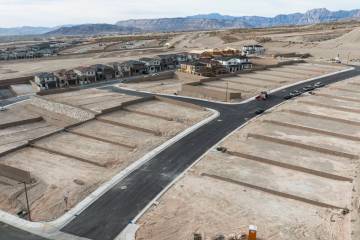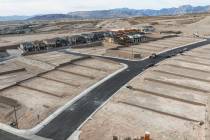September foreclosure starts, sales slip locally
Nevada foreclosure starts dropped nearly 30 percent in September from the previous month, and foreclosure sales fell 20.3 percent as banks continue to evaluate "robo-signer" documents, a foreclosure expert said Wednesday.
After a significant jump in August, driven primarily by Bank of America, foreclosure filings returned to levels in line with prior months, said Sean O'Toole, chief executive officer of Discovery Bay, Calif.-based online listing service ForeclosureRadar.
The numbers remain far below their peak, he said. In Clark County, notice of default filings decreased 33.3 percent from the previous month to 3,649 in September. That's down from 6,195 default filings in the same month a year ago.
Notices of trustee sale, which set the time and date for auction, declined 1.5 percent to 3,110 in September, but are down 51 percent from 6,325 in September 2010, ForeclosureRadar reported.
"You think September's down, wait until you see October," said Michael Sommermeyer, quality assurance manager for Nevada's foreclosure mediation program. "In a slow month, we see 3,000 notices (of default). The first week of October, we had nine. I just about fell out of my chair. I called Washoe County. They had three. That's a whopping total of 12 between the two biggest counties."
The drop in default filings is likely due to a new law that took effect Oct. 1. Among other things, the law requires a party seeking to foreclose in Nevada to record a notarized affidavit proving they have the legal right to exercise the power of sale.
"I can't imagine what's going to happen to home prices if foreclosures are halted for some time here," said Robin Camacho of Neighborhood Realty. "Sounds as though we'll see no short sales, either. Why would anyone try to short-sell their home if the bank isn't filing (a notice of default)?"
Tactics such as making banks produce the original promissory note began to emerge a couple of years ago.
Florida's Supreme Court ruled in February 2010 to require verification of mortgage foreclosure complaints involving residential property. The primary purpose is to provide incentive for the plaintiff to "appropriately investigate and verify its ownership of the note or right to enforce the note," the court wrote.
With increased scrutiny of documents filed by so-called "robo-signers," banks are taking longer to foreclose, O'Toole said. The time from notice of default to auction as of September was 378 days for Clark County, 47 percent longer than a year ago, his firm reported.
"I don't necessarily think delays from robo-signing are all that bad for banks," O'Toole said. "This whole thing allows them to slow the process down further. At the end of the day, even though they've got litigation costs, it's not as bad as recognizing all their losses, which would impair their solvency."
Foreclosure sales were mixed in the West, with declines in Arizona, California and Nevada, and increases in Oregon and Washington. Nevada's numbers are still up from July, but significantly lower than a year ago and trending downward, O'Toole said.
Despite the declines, the percentage of homes purchased by third parties at auction -- typically investors -- was at or near peak levels, he said. In California, third parties made up a record 27.4 percent of all sales during the month. In Arizona, it was 38.3 percent, also a record. Nevada was just shy of the record, set in August at 29.1 percent.
"While foreclosure activity returned to its normal course in September, we fully expect to see more volatility like we saw in August as banks continue to work in fits and starts through robo-signing and other issues," O'Toole said. "It's almost unfathomable that four years into this crisis there would still be so much uncertainty on how to best deal with the trillions in bad mortgage debt that was created during the credit bubble."
Even amid reports of Las Vegas having the nation's highest foreclosure rate, availability of real estate-owned listings has continued to decline throughout the year, Forrest Barbee of Prudential Americana Group said.
The REO inventory is hovering around 2,800 in October, down from more than 3,500 in January, Barbee noted.
"That strongly suggests that banks, Fannie Mae and Freddie Mac are taking those properties back in foreclosure proceedings and holding them off the market," he said. "In fact, we know of quite a few instances now where Fannie Mae is renting back to the foreclosed owner for at least a year. These institutions are using rent-back and other mechanisms as an inventory management tool. Look for this trend to continue."
Barbee said he's seeing a slight increase in short sales, or lender-approved sales for less than the principal mortgage balance, which now comprise about 24 percent of all sales. The median price of a short sale in August was $125,000, compared with $107,900 for an REO.
Contact reporter Hubble Smith at hsmith@reviewjournal.com or 702-383-0491.




























